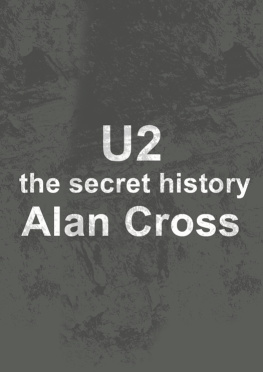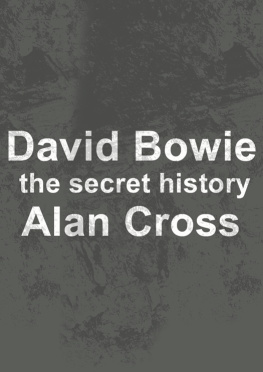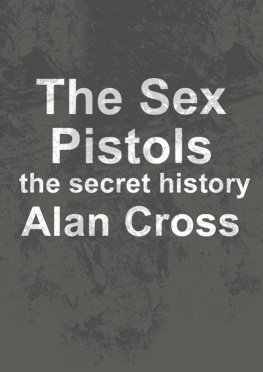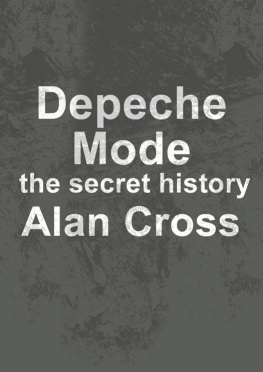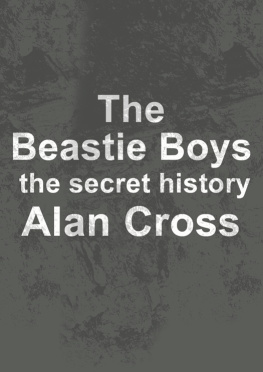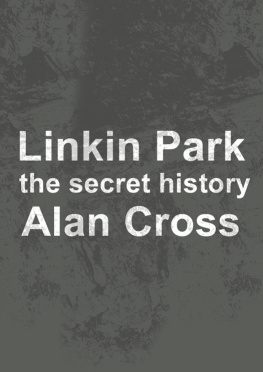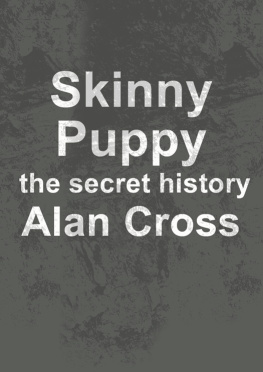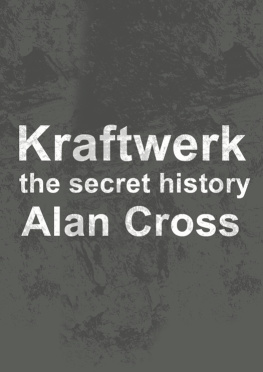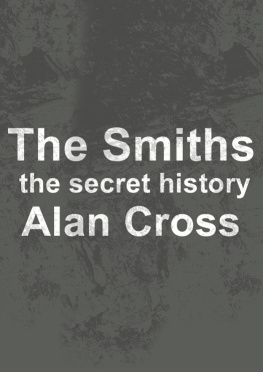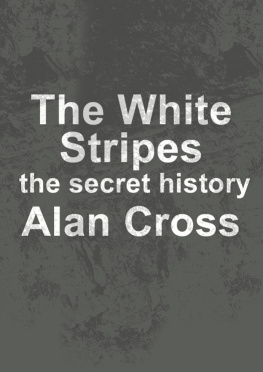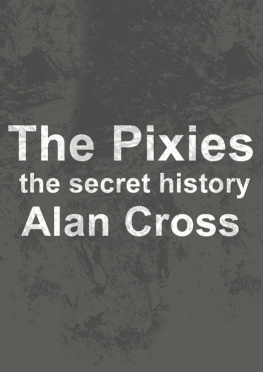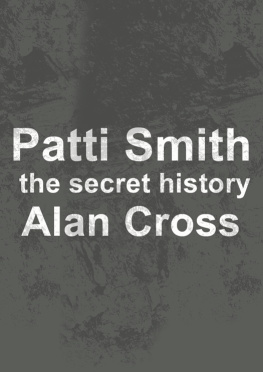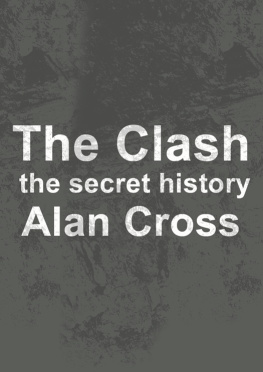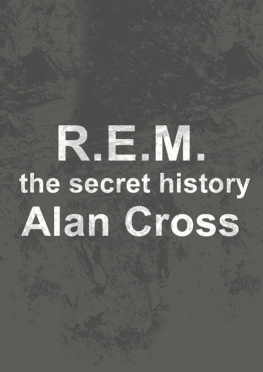Alan Cross - U2: the secret history
Here you can read online Alan Cross - U2: the secret history full text of the book (entire story) in english for free. Download pdf and epub, get meaning, cover and reviews about this ebook. year: 2012, publisher: HarperCollins Canada, genre: Non-fiction. Description of the work, (preface) as well as reviews are available. Best literature library LitArk.com created for fans of good reading and offers a wide selection of genres:
Romance novel
Science fiction
Adventure
Detective
Science
History
Home and family
Prose
Art
Politics
Computer
Non-fiction
Religion
Business
Children
Humor
Choose a favorite category and find really read worthwhile books. Enjoy immersion in the world of imagination, feel the emotions of the characters or learn something new for yourself, make an fascinating discovery.
- Book:U2: the secret history
- Author:
- Publisher:HarperCollins Canada
- Genre:
- Year:2012
- Rating:5 / 5
- Favourites:Add to favourites
- Your mark:
- 100
- 1
- 2
- 3
- 4
- 5
U2: the secret history: summary, description and annotation
We offer to read an annotation, description, summary or preface (depends on what the author of the book "U2: the secret history" wrote himself). If you haven't found the necessary information about the book — write in the comments, we will try to find it.
Alan Cross is the preeminent chronicler of popular music.
Here he provides a history of U2.
This look at the band -- Four Hearts Beat as One -- is adapted from the audiobook of the same name.
U2: the secret history — read online for free the complete book (whole text) full work
Below is the text of the book, divided by pages. System saving the place of the last page read, allows you to conveniently read the book "U2: the secret history" online for free, without having to search again every time where you left off. Put a bookmark, and you can go to the page where you finished reading at any time.
Font size:
Interval:
Bookmark:
Theres a well-defined pecking order among performers. First, theres your basic unsigned indie band. They play a lot of clubs and parties and may even have scraped together enough money to put out one or two records. Next are the groups who have a major-label contract. Although most of the members have probably quit their day jobs, the truth is that they sell just enough records to stay afloat. The third level consists of genuinely successful groups, bands with gold and platinum albums. Their music careers have turned into well-paying jobs, with all the associated rights, privileges and perks. In the press and among fans, they are often referred to as stars and even superstars. In other words, these bands have made it.
There is, however, another level beyond superstar. In the upper reaches of celebrity, there are performers whose albums sell in the tens of millions. Not only are they rich beyond their wildest dreams, but everything they touch has an enormous trickle-down effect. While many profit from the albums and concert tickets they sell, thousands (perhaps even tens of thousands) of ordinary people benefit from the fallout of their investments in real estate and the stock market. They are so huge that national governments begin to depend on the tax revenue these groups generate in the economy; in fact, their gigantic profits may even have an impact on the countrys GDP. These bands are far beyond being mere superstars; they are industries.
U2 is such an industry. Record sales are approaching 100 million units. Gross revenues have been tallied at $1.5 billion. Estimates of the groups net worth in 1999 ranged from $250 million to $500 million. U2s actions have even been known to affect the stock price of their record label. Through their entertainment and real estate ventures, their organization provides employment for hundreds of people.
But unlike the typical faceless multinational, U2 has a conscience. Theyre fiercely loyal to their hometown, reinvesting some of their enormous profits in various Dublin ventures, including the local arts scene. They contribute incredible amounts of time and money to charities, both big and small. Theyre politically active, railing against the injustices of governments and corporations. In fact, U2 has probably encouraged more people to think about political, social and human rights issues than any other rock group on the planet.
Underlying all this is the fact that U2 has accomplished everything with music. Theyve successfully walked a series of fine lines: the line between good Christian values and bombastic preachiness; the line between constructive political dialogue and propaganda; the lines between rock, punk and Irish folk; the line between genuine passion and cartoonish buffoonery; and the line between being ultra-superstars and four regular guys from Dublin. Commercially successful, critically acclaimed and highly influential, U2 remain one of the most important groups in the history of rock and roll.
It all began with a note on the bulletin board at Mount Temple Comprehensive School in Dublin in the fall of 1976. It was placed there by 15-year-old Larry Mullen (born October 31, 1961). Having played the drums since he was nine in such prestigious outfits as the Post Office Workers Band, Larry was finally going to form his own rock group. He had already approached a student named Adam Clayton (born March 13, 1960) because Larry thought he was cool looking. Plus Adam already owned a bass guitar.
Although he owned a guitar and boasted he could play like a pro, he was actually quite inept. The others eventually told him to put the thing down.
This, however, was when things started going right. Paul instinctively assumed command of the rehearsals, directing everyone else and somehow inspiring everyone to play better. He also started to sing along as the band struggled through their favorite Stones and Bowie tunes, bumping and grinding like some young Elvis. The others were impressed; even without any formal vocal training, Pauls voice wasnt bad and he had a commanding presence. When it was all over, a vote was taken: Paul could stay providing he took the job as singerand promised to leave his guitar at home. In the cacophony that reigned throughout those first rehearsals, the band found themselves a name: Feedback.
There were also two more name changes. As members of a new quasi-gang known as the Village (perhaps best described as a street gang crossed with the Dead Poets Society and a Gaelic study group), Paul and Dave had acquired new nicknames. Derek RowenGuggi to the guys in the Villagewas the person who christened Paul. While walking together down OConnell Street in Dublin, they came across a hearing aid shop across from the old Gresham Hotel. The store, at 13 North Earl Street, was called Bonavox Hearing Aids. From that moment on, Guggi declared, Paul would forever been known as Bonovox (or, alternatively, Bono Vox)Bono for short. Meanwhile, because of the apparent angular shape of his skull, Dave Evans was renamed The Edge.
The Hype rehearsed as often as they could over the next year, usually in the Mullens front room. When Adam was expelled from school, he threw all his energies into the band. He tried to learn all he could about equipment, sought advice on getting gigs and generally tried to spread the word on his new group. As far as anyone can remember, the Hypes first professional gig was played at a Dublin club called McGonagles in early 1978. Opening for a band called Revolver, they spun through a short set that mainly featured Stranglers and Sex Pistols tunes.
On March 17, 1978, the Hype performed in a talent contest in Limerick that was sponsored by a beer company. After making it through the early rounds, the groups final three-song set won them the 500 first prize and an opportunity to record a demo for CBS Records. Although the session turned out poorly (CBS told them to come back and try again later in the year), the group was energized by the experience. Adam was especially jazzed and redoubled his efforts at making things happen.
Adam certainly wasnt shy. He was fearless on the phoning, once ringing up Thin Lizzys Phil Lynott for advice on how to choose a manager. On another occasion, he called Steve Averill, singer of an Irish band called the Radiators, who happened to work at an ad agency by day. Talking about the importance of finding the right name for the band, Averill suggested that the Hype might wish to consider going with U2. It was short, snappy and had a vaguely political ring to it. Shortly after the group returned from Limerick in March 1978, the Hype played a show at the Howth Community Center. Midway through the show, Dik Evans bid everyone farewell, walking off the stage and out of the band forever. At that moment, the Hype became U2.
The next important step was to find a manager so that Adam could concentrate on making music with the rest of the band. His first attempt was a fake ad in the classifieds of the NME. It read Manager seeks the whereabouts of the Hype after an amazing gig. Please ring Brian. It was great, lads. Of course, there was no Brian; the phone number belonged to Adam. No one called.
Although he wasnt much into punk or new wave, McGuinness checked out U2 when they played the Project Arts Centre on May 25, 1978. He was immediately impressed by what he saw: a young band of true friends, bound together by spirit, energy and honesty. The singer, he thought, was especially charismatic. Musically, they still needed work; nevertheless, McGuinness felt that with time and effort, their ambition would overcome their technical deficiencies. As the group continued to play in front of ever larger crowds at schools, youth centers and pubs like the Baggot Inn and the Moran Hotel, he was proven correct.
U2s first official release was
Font size:
Interval:
Bookmark:
Similar books «U2: the secret history»
Look at similar books to U2: the secret history. We have selected literature similar in name and meaning in the hope of providing readers with more options to find new, interesting, not yet read works.
Discussion, reviews of the book U2: the secret history and just readers' own opinions. Leave your comments, write what you think about the work, its meaning or the main characters. Specify what exactly you liked and what you didn't like, and why you think so.

